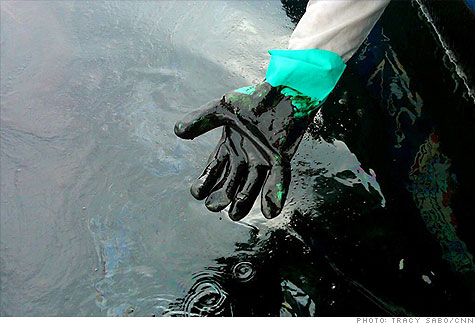Search News

FORTUNE -- Last week I wrote a short legal primer aimed at answering some key questions surrounding the legal landscape of the BP Gulf Coast oil spill. At the same time, I invited readers to send me their questions, so I could take a stab at those, too. Here goes.
In general, my own questions focused on BP (BP)'s civil liability under the Oil Pollution Act of 1990 (OPA), and whether the company would really be subject to OPA's $75 million limitation on liability. (Basically, my answer was no.) Readers had a few follow-up questions about those topics, but also inquired about two other matters: how else can BP be punished and how imperiled are their own investments in peripheral players in the catastrophe -- especially Transocean (RIG), Halliburton (HAL, Fortune 500), Cameron International (CAM, Fortune 500), and Anadarko Petroleum (APC, Fortune 500).

Finally, several readers, apparently of an entrepreneurial bent, wanted to know exactly who owns the spilled oil. Specifically, they wondered, could they skim some off the surface and resell it to refiners themselves?
When BP says it will pay for all costs of cleaning up the oil spill, does that mean it is committing to restoring the Gulf to its previous state?
No. "Clean-up" means removal of the oil, according to Vincent Foley, a partner at the law firm of Holland & Knight, who specializes in maritime law and has testified before Congress about Deepwater Horizon oil spill liability issues. To the extent that natural resources are damaged over the long-term -- diminished fish stocks, for instance -- states can sue to recover damages for those under OPA, but that's not considered "clean-up" costs, which is what BP is voluntarily taking on.
You said in your primer that BP is "100% responsible" for clean-up costs. But what about other investors in the well, like Anadarko?
As the federally-licensed operator of the oil well, BP has been designated as the "responsible party" under OPA, meaning that it is 100% responsible for the clean-up costs in the first instance. It can, however, go after other parties for contribution, including investors in the well.
Though BP operated the well, it owned only a 65% interest in it. Anadarko Petroleum Company owned 25% and Mitsui Oil Exploration owned 10%. (According to the Wall Street Journal, Mitsui Oil Exploration, in turn, was 70% owned by trading company Mitsui & Co.; 20% by the Japanese Ministry of Economy, Trade and Industry; and 10% by assorted Japanese investors.)
Anadarko's SEC filings suggest that it anticipates being on the hook for one-quarter of the damages unless certain indemnification provisions kick in, though it did not specify the terms of those indemnifications. Anadarko's insurance for its interest in the well comes to only $177.5 million, less deductibles of about $15 million, according to its filings, so it had better hope those indemnification provisions do apply.
According to one lawyer I spoke with, a standard joint operating agreement in this industry would usually provide that a passive investor like Anadarko would be on the hook for its pro rata share of liability unless the operator, BP in this instance, acted in "gross negligence."
Anadarko's spokesman declined to comment on whether this was, indeed, Anadarko's situation. "Our priority right now is to continue offering help to the Unified Command and at the same time be mindful of the interests of our stakeholders," he said.
If I were a betting man, I'd guess that Anadarko has an enormous incentive to prove gross negligence on BP's part.
Mitsui Oil Exploration's spokesman was as laconic as Anadarko's: "MOECO is unable, at this time, to determine the cause of the incident, and the impact, if any, that the incident will have on MOECO's future operating results, financial positions, or cash flows." He declined further comment, citing the pending U.S. government investigation.
A BP spokesperson said she did not know what BP's indemnification agreements were with Anadarko or Mitsui, and that BP's legal team was "so focused on other things" that I should call back "in a couple weeks when things have quieted down a bit."
What about contractors, like Halliburton, Cameron International, and Transocean?
Both Halliburton, which did cement work on the well, and Transocean, the Swiss owner of the rig, have claimed in SEC filings or in congressional testimony that they have broad indemnification agreements with BP that will leave BP holding the bag for virtually all the spill costs -- assuming, of course, that BP stays solvent. In its SEC filings, for instance, Transocean says that that BP has assumed "full responsibility for any loss, expense, claim, fine, penalty or liability for pollution or contamination, including control and removal thereof, arising out of or connected with operations under the contract" and that BP has agreed to "indemnify us and bear the cost of bringing the well under control in the event of a blowout or other loss of control."
(Halliburton and Transocean will certainly bear exposure to the personal injury suits being filed on behalf of the 11 dead and at least 17 injured workers, although, according to the congressional testimony of a top Halliburton lawyer, there are reciprocal indemnification agreements in place whereby a Halliburton will indemnify BP for suits brought by BP workers, while BP indemnifies Halliburton for suits brought by its employees. The lawyer, senior vice president and deputy counsel James W. Ferguson, testified that such agreements were standard practice in the industry.)
Notwithstanding Transocean's assertions, BP's lawyers evidently have some theory under which they think they can invalidate the oil-spill indemnification agreements Transocean thinks it's protected by. BP has already sent a demand letter to Transocean's excess insurers, seeking to tap the $750 million in insurance obligations they owe to Transocean. That letter prompted those insurers, led by certain underwriters at Lloyd's of London, to sue BP in Houston in May for a judicial declaration that they owe BP nothing. (Transocean and its insurers both acknowledge responsibility for any oil leaks coming from Transocean's rig, which floated on or above the water, but not for any leaks from the well itself, a mile below the surface. So far, virtually the entire spill is assumed to come from the latter.)
As previously noted, BP's spokesperson said she could not address my questions about BP's indemnification arrangements.
The general counsel of Cameron International, which made the blow out preventer (BOP) on the well -- one of the crucial safeguard devices designed to avert disasters like this one -- told a congressional committee last month that it was "far too early to draw factual conclusions about how the incident occurred" and, therefore, it was also "impossible for anyone to make liability determinations at this point." Cameron's SEC filings say that it has $500 million of insurance available.
Isn't BP exposed to some sort of per-barrel fine?
Yes. Though my primer dealt mainly with the Oil Pollution Act of 1990 (OPA), BP is also subject to substantial penalties under the Clean Water Act (also known as the Federal Water Pollution Control Act). Specifically, it can be hit with either $37,500 per-day or $1,100 per-barrel civil penalty for oil spills, even without a showing of wrongdoing on its part. Consulting the PBS News Hour Oil Leak Widget, readers can see that by even the most conservative estimates, BP's per-barrel exposure is already around $1 billion. (Remember that there are 42 gallons in a barrel.) If BP is shown to have been guilty of "gross negligence" or "willful misconduct," those penalties can be trebled. Turning to "experts' worst case" scenarios for the size of the oil spill, and assuming gross negligence, one can at least theoretically jack those penalties up to devastating levels.
These penalties would ordinarily be sought by the Environment and Natural Resources Division of the U.S. Department of Justice, and any money collected would go into the Oil Spill Liability Trust Fund, described in the primer.
One lawyer points out to me that BP would probably much rather pay cleanup costs and civil damages than Justice Department penalties, since the latter are not tax deductible. The prospect of imposing these gives the government enormous bargaining leverage over BP, even before one begins talking about the potential criminal sanctions BP could face. U.S. Attorney General Eric Holder has, of course, said that he is looking into the possibility of criminal violations of at least four environmental laws.
Worse yet for BP, it's a recidivist offender. BP units were on probation for two prior environmental crimes when the Deepwater Horizon exploded on April 20. In October 2007, two BP units simultaneously agreed to plead guilty to environmental crimes relating to two different incidents. (One was a felony violation of the Clean Air Act that helped cause an explosion at its Texas City refinery in March 2005, killing 15 and injuring more than 170. BP was fined $50 million and ordered to institute safeguards that cost it about another $265 million. The other was a misdemeanor violation of the Clean Water Act stemming from two oil pipeline leaks in 2006, which drenched stretches of Alaskan tundra with 200,000 gallons of crude oil. BP was fined $20 million for that one.)
Who owns the spilled oil? If I skim some off the surface, can I resell it to a refiner?
Though neither of two experts to whom I posed these questions was immediately confident of the answer to the first one, they both thought the answer to the second question was no.
"It's not finders keepers," says Foley, of Holland & Knight. Both he and Chris Kende, an insurance specialist at Cozen O'Connor, thought the oil belonged to either the federal government, from whom BP licensed the right to drill, or to BP.
A reader who wants to claim ownership of oil he collects would probably have to claim that BP "abandoned" it, Kende said, "which, I think, would be hard to prove." Alternatively, he continued, the reader could use "some kind of novel salvage theory, like the old Spanish galleon cases." In maritime law, he explains, if you salvage an old sunken vessel or its cargo, you can stake a claim in it. But to do that here, he says, "you would have to 'sue' the oil you recovered to assert a lien for the salvage." More important, he says, "salvage only applies to maritime property like vessels or cargo on board vessels," and this oil never reached a vessel and was, thus, never cargo. ![]()






| Company | Price | Change | % Change |
|---|---|---|---|
| Ford Motor Co | 8.29 | 0.05 | 0.61% |
| Advanced Micro Devic... | 54.59 | 0.70 | 1.30% |
| Cisco Systems Inc | 47.49 | -2.44 | -4.89% |
| General Electric Co | 13.00 | -0.16 | -1.22% |
| Kraft Heinz Co | 27.84 | -2.20 | -7.32% |
| Index | Last | Change | % Change |
|---|---|---|---|
| Dow | 32,627.97 | -234.33 | -0.71% |
| Nasdaq | 13,215.24 | 99.07 | 0.76% |
| S&P 500 | 3,913.10 | -2.36 | -0.06% |
| Treasuries | 1.73 | 0.00 | 0.12% |
|
Bankrupt toy retailer tells bankruptcy court it is looking at possibly reviving the Toys 'R' Us and Babies 'R' Us brands. More |
Land O'Lakes CEO Beth Ford charts her career path, from her first job to becoming the first openly gay CEO at a Fortune 500 company in an interview with CNN's Boss Files. More |
Honda and General Motors are creating a new generation of fully autonomous vehicles. More |
In 1998, Ntsiki Biyela won a scholarship to study wine making. Now she's about to launch her own brand. More |
Whether you hedge inflation or look for a return that outpaces inflation, here's how to prepare. More |